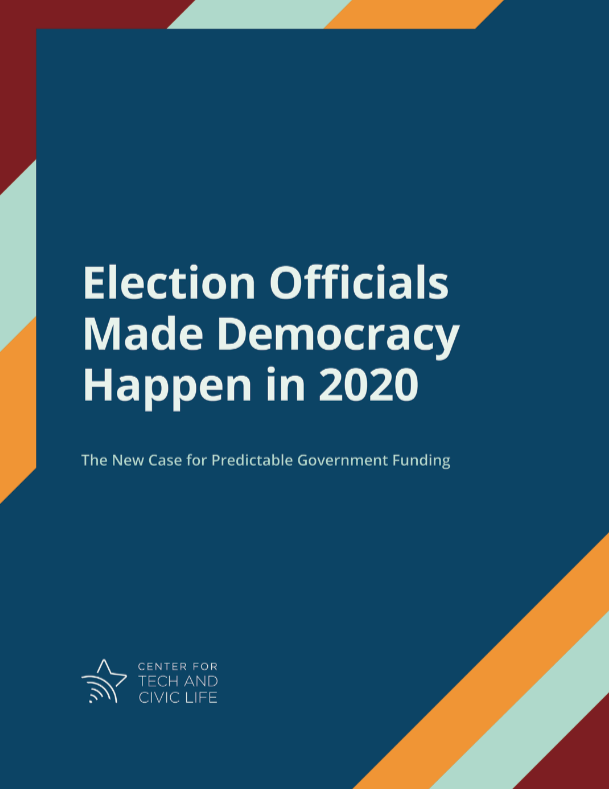Election Officials Made Democracy Happen in 2020
It’s been one year since the November 2020 elections. For many election administrators, the 2020 election was the most challenging election of their entire career, and we’re unbelievably grateful for all the work they did — and continue to do! — to make democracy happen.
As part of CTCL’s COVID-19 Response Grant program, we had nearly 2,500 grantees, scattered across the country in election offices large and small. As part of the grant reporting process, grantees shared their stories, their photos, their accomplishments, their struggles, their hopes and dreams.
We wanted to share back everything we learned with grantees, so we created a report: Election Officials Made Democracy Happen in 2020: The New Case for Predictable Government Funding. It’s more accurately described as a “love letter” than a report, and it’s brimming with grantee words and grantee photos. We crafted, designed, and mailed a physical copy to every grantee. If you don’t have a print version, we recommend reading the PDF version, although we’ve also included an accessible text version below.
Election Officials Made Democracy Happen in 2020
The New Case for Predictable Government Funding
Table of Contents
Who you are
The CTCL COVID-19 Response Grant Program distributed nearly $350 million to support election administrators across the country as you worked to make the 2020 elections safe, secure, professional, and inclusive.
You made an incredible difference in your jurisdiction — and collectively, you made a difference for nearly 2,500 jurisdictions, across 47 states, representing roughly 60% of eligible U.S. voters.
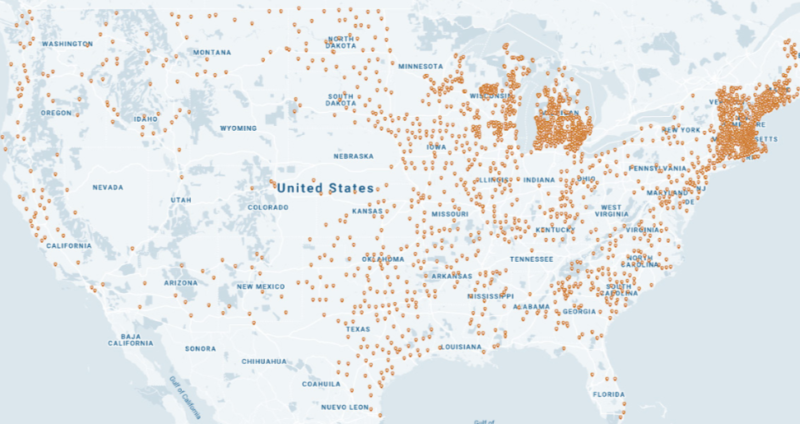
You delivered and you are diverse. Over 70% of you serve small jurisdictions with fewer than 25,000 voters. You’re a tiny jurisdiction in Texas that used grant funds to buy ‘I Voted’ stickers for the first time. You’re a city in Massachusetts that hired interpreters at each polling place to assist non-English speaking voters. You’re a Montana county that spent nearly 100 times your normal voter education budget. You’re a Georgia county that reached rural voters with a mobile voting bus. You’re
a county in Hawaii that translated voting materials into Hawaiian for the first time. You’re a Mississippi county that safely trained poll workers with an FM transmitter while they stayed in their cars. You’re a town of 600 people, a city of 6 million, and you successfully administered the most challenging election of your career in the midst of a global pandemic. We’ve said it before, and we’ll say it again —
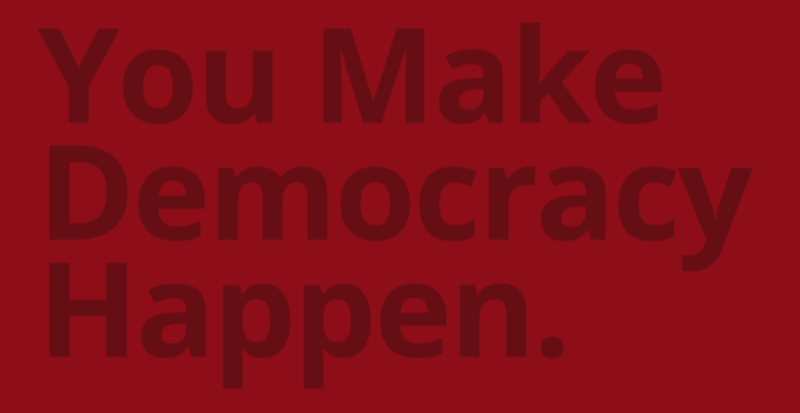
In 2020, CTCL was proud to support your work, but we also recognize that private philanthropy is not a long-term solution to chronically underfunded election administration. Elections are critical infrastructure, and they should be funded that way. We hope you can draw on this report to both reflect on your experience in 2020 and envision what U.S. election administration might look like with predictable, robust public funding into the future.
With love and gratitude,
Tiana Epps-Johnson, Executive Director
Whitney May, Director of Government Services
and the whole team at Center for Tech and Civic Life
What you accomplished
You survived.
“I think just surviving the enormous task that was before us is worth celebrating.”
“Having served the citizens of this County and State for over 37 years in elections, experiencing the toughest election cycle EVER, AND having survived, without many problems, I can say ‘thank you’. I STILL love my job.”
You avoided disaster.
“I often think about the disasters that could have occurred had we not had this funding to alleviate choke points and barriers to voting.”
“This unprecedented voter participation simply would have crippled the administration of our elections with devastating effects if we were left with the limited available municipal funds already hampered by the pandemic.”
You recovered from budget shortfalls.
“Without this grant, the Board of Elections budget would have been way over budget. Our community already has a stretched and limited budget because of COVID. It would have made it nearly impossible.”
“Our annual county budget was expended after the Primary Election, so having the funds to address essential election expenses from the CTCL grant was critical for the election cycle 2020.”
You complied with state mandates.
“Unfunded mandates completely depleted our budgets and the CTCL grant was truly a gift that allowed us to go above and beyond to serve the voters.”
“Local municipalities set out small, tight budgets for elections while our state continues to push down expenses to us with unfunded mandates.”
You handled COVID emergencies.
“Our County has a polling place in a resident’s home. Two days prior to the General Election the lady who lives there and is the inspector came down with Covid. We were able to purchase canopies, tables and chairs to make a makeshift polling place in her front yard so not to inconvenience voters by relocating.”
“Three of our Board of Elections employees traveled to a nearby county to assist them in their recanvassing process. We had completed our certification, but they had not because 12 of the 22 individuals in their office had tested positive for COVID… To us, it was a no-brainer to assist another county that had fallen behind because of COVID issues.”
You recruited and hired enough staffing.
“Our regular workers are generally elderly and most, wisely so, were unwilling to risk COVID-19 exposure at the polls. CTCL funds allowed us to recruit and train enough new workers to have ample coverage at the polls for in-person voters and to process the overwhelming number of absentee ballots. The result was we created a pool of enthusiastic new workers excited to continue to work at future elections, which is awesome!”
“I was so very proud that because of you my overworked staff of just 4 people who were doing their best to work with 20,000 registered voters saw that I was able to hire additional staff to lighten their load. We were all exhausted and I still don’t know how we put in all of those extra hours that were required.”
You handled a dramatic increase in mail voting.
“The mail ballot program, which has historically processed 40,000 applications, expanded to process 180,000 applications in November 2020. The new equipment and additional staff for processing applications and ballots made it not only possible to handle the volume, but also have improved the efficiency and accuracy of the process.”
“When COVID plagued us all our absentee requests tripled. Several of my staff worked well past their 8 hour paid day, volunteering their extra time to ensure that all the absentees were folded, packed and mailed in a timely manner. I was able to purchase a folding machine with the grant money. This is an amazing machine which has drastically reduced the time it takes to pack absentees. Freeing our staff to complete their other duties.”
You managed lines.
“We focused on improving our systems to allow for moving voters through as quickly as possible while still keeping strict social distancing procedures, understanding that a crowded voting room is dangerous, but also extended periods in line. With the purchase of additional booths and check in systems, we dramatically impacted our speed and efficiency in which we moved through in-person voting. We took it to a whole new level.”
“The town was able to provide shelter for voters while waiting in line to enter the polls. There was lots of positive feedback that the tent was heated and comfortable while allowing voters to social distance while having to wait to enter the building.”
You improved security and integrity.
“We were able to make some improvements to our polling place that helped with securing ballots. There were issues with several doors that allowed unauthorized access. Although there were never any issues with voting security, there was the opportunity. With the grant funds, we were able to make needed repairs to the doors.”
“As a result of being awarded grant money, we were able to implement the Connecticut Voter Registration System effectively in our office. This is exciting as this will have an effect on the efficiency, security & organization of future elections. This was a tool that we were previously unable to use because we didn’t have the money to get the project started.”
You educated your voters.
“Without the grant, my office had no funding for voter education and outreach. With the grant funding, we created a simple but highly effective media campaign to drive voters to the official election websites. The websites provided crucial information in our vote-by-mail environment and newly implemented same-day voter registration.”
“We implemented a robust voter education and outreach campaign. We utilized paid media such as digital, radio, and TV ads, as well as earned media such as social media posts, newspaper ads, and speaking engagements… We believe this effort contributed to record voter participation in this county and fewer rejected ballots.”
You counted the votes on time.
“Without this additional staff we would not have been able to complete our counting on time to provide the canvass in time for the statutory deadline.”
“We would not have been able to process all the ballots without these funds.”
You ran voter-centric elections.
“For the first time we actually focused on the voter.”
“For the first time in 16 years, I feel that we were able to operate elections without worrying about budget and fully meet the needs of our citizens.”
You invested in future elections.
“We will be able to conduct future elections entirely using this new technology… We will no longer need to use preprinted ballots, which will save us tens of thousands of dollars each election year. Also this equipment significantly reduces the amount of man power and human involvement during elections, reducing the chance of errors during the voting process.”
“In addition to helping us address short-term concerns directly related to the COVID-19 pandemic and the 2020 election, the CTCL grant funds also afforded the BOE the opportunity to try to address some longer-term gaps in our election infrastructure, ensuring that we will be more resilient to the next set of Election Day challenges we face.”
You went above-and-beyond past elections.
“I have been the Town Clerk here for the last 20 years and I have to say that this was the largest and most organized election I have ever run. Having the extra funds for staffing and supplies was a godsend.”
“In 20 years of working in elections, I’ve never had the feeling of not worrying about costs, and running with all the good ideas in order to make the election successful. We’ve always had to shelve ideas because of costs… Nov 3 was the best run election I’ve ever administered, and it was the 53rd election that I’ve worked on since I began working in the Clerk’s Office.”
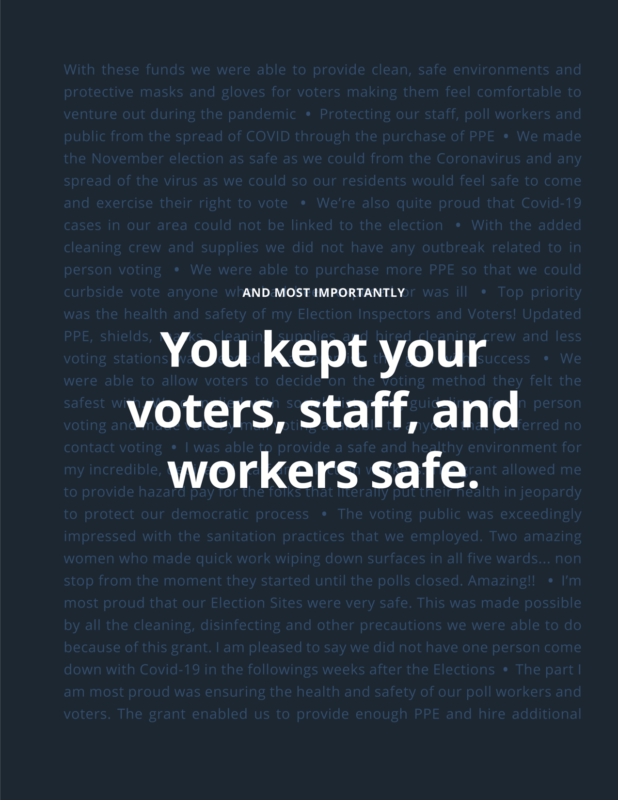
What’s holding you back
Unfortunately, many of you feel under-appreciated, under-supported, overwhelmed, pessimistic, exhausted, burnt out, and sometimes even afraid for your safety or your loved ones’ safety. This breaks our hearts. You make democracy happen, and you deserve better.
Increasingly difficult job
Elections are increasingly complicated. Even tiny counties with 1,000 voters need to stay up-to-date with election cybersecurity. You need contingency plans for power outages, equipment failures, and other emergencies. Many of you feel challenged and frustrated by the ever-changing laws and regulations, with sentiments like: “Just when I feel I have it all figured out, things change and I have to learn it all again.” And the more complicated elections get, the more difficult it is to train your workers, educate the public, and uphold the law. As one grantee explained, “I feel stretched in too many directions without the adequate time to devote to each responsibility.”
Understaffed and underresourced
The most common challenge we heard — common enough to consider it pervasive and systemic — is that your offices are understaffed and underresourced. One election official broke down crying when he received the grant funds, because he could finally pay his staff. Without the grant funds, another office planned to dip into their staff salaries to pay temporary workers. Many offices hired much-needed help for the first time — “Previous to this I was a one woman office and was run to death.” In addition to staffing challenges, hundreds of you described aging or broken equipment that you don’t have the resources to replace.
Intruding into personal life
Your job should not interfere with your personal life, your family, or your health, and it’s terrible when it does. Many of you reported excessive workloads that consumed your nights and weekends in the months leading up to the election, keeping you away from your families. One clerk now has an injured rotator cuff and carpal tunnel syndrome because of overwork. Several of you caught COVID-19 while assisting COVID-positive voters, some were hospitalized, and at least one election staffer passed away due to COVID. We learned that a grantee’s child was bullied at school because of the misinformation around fraudulent election administration. Many election officials have received death threats for similar reasons.
Pessimism about the future of elections
Although 2020 is behind us, your challenges are not. Many of you feel pessimistic about the future of elections. You worry about misinformation, public distrust, and angry voters — “I never thought I would see the day when our profession would be under attack.” Many feel overworked, unappreciated, and underpaid — some part-time clerks make as little as $5-8,000 per year for a hefty workload. One grantee reported, “My work pay is one day a week but I spend at least three days working as I am salaried and the workload has tripled since I started out in 2005.” When you eventually retire, we hope it’s after a long and happy career, but some of you are leaving elections sooner because you’re unhappy. One person said the grant “saved me from walking away from the job. I was not going to watch the ship sink.”
Your ongoing funding shortage
Luckily, some of you only needed funds because of pandemic-related costs. As one grantee wrote, “Typically, I am able to meet my election needs in our annual budget. This year, as you know, was just enormously challenging.” This makes sense — the COVID-19 Response Grant Program was a direct response to the pandemic. We secured emergency funding because thousands of election offices needed extra money, above-and-beyond what’s needed in normal years.
But it’s clear from your stories that elections are chronically underfunded. The pandemic exacerbated an existing funding shortage that began long before 2020. While a handful of you feel adequately funded, the vast majority don’t. You used words like “desperate” to describe your funding needs.
“Human resources and elections equipment are the areas in which we struggle for each Election. It seems we do without and make the best of what resources we may have due to tight budgets.”
“If additional election funds were available locally in our annual budget, we would be able to purchase and implement newer technology desperately needed. Our optical scan tabulators are more than 20 years old and no longer manufactured; parts remain scarce.”
“[We replaced] hand crank ballot boxes that were manufactured in the early 1900’s and therefore not able to find parts to repair them. One was held together with duct tape. They will be donated to our historical society.”
“Funds for basic needs are always tight. CTCL funds allowed us to meet some basic needs of regular elections staff that regular funding is not adequate to cover.”
“We got 4 new booths!!! I have tried for 15 years to get new booths! Thank you!!!”
“The extra funds allowed me to provide training to election clerks and ballot counters for the first time in… I’m not sure how long.”
“We were able to purchase VOTE HERE SIGNS and I VOTED stickers… we are a very poor county and these items have never been an option.”
“[The] tables in our community center that are used on election day have been falling apart, are unstable (with many broken and unusable) and are also not easily cleaned due to missing laminate sections on top.”
“If any funds are available, we’d welcome the opportunity for more funds… for a new elections center. We desperately need space to safely support elections as we are busting at the seams.”
Your differences in funding
Your funding shortage is pervasive, but it isn’t universal — and it heavily depends on where you’re located. An election department in an impoverished jurisdiction — funded by that impoverished jurisdiction’s tax revenue — will usually have fewer voting locations, less communication to voters, and fewer staff members.
The result? Some grantees achieved incredible things, like mobile voting buses, robust education campaigns, and real-time line-tracking software. While other grantees bought “I Voted” stickers for the first time, replaced duct-taped equipment, and installed internet in the office. Some of you declined the full grant amount, while others said the grant amount wasn’t nearly enough. Some elections thrived, while others barely survived.
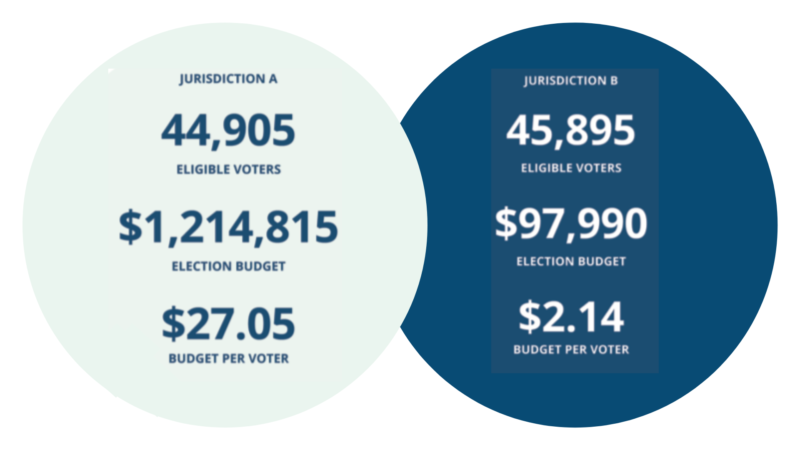
What you could accomplish
Your critical election infrastructure should not be duct-taped together. What would it look like if elections were thriving, not just surviving?
We asked all 2,500 of you what you could accomplish if your elections budget permanently doubled. The most common refrains were 1) more staffing, 2) equipment and supplies, and 3) voter education.
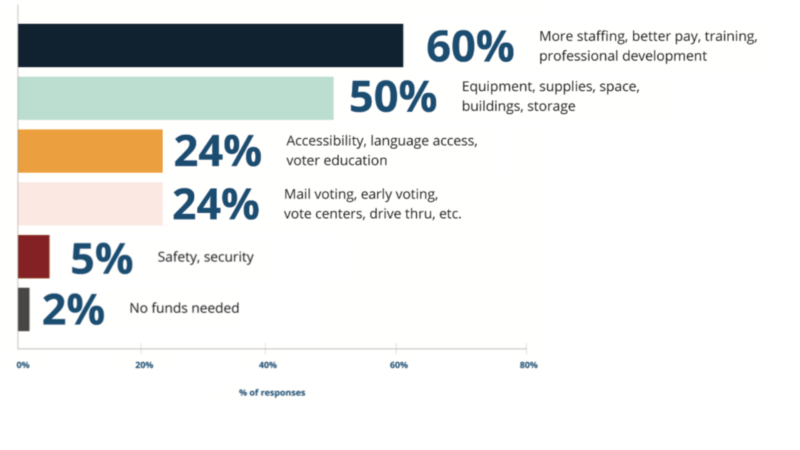
“I would be able to have money to pay election workers to help out with the many things that are needed to be done prior to election day rather than me doing them without pay.”
“We would hire additional staff to help us keep up with the large volume of work as it relates to putting on an election. Some staff members worked 12 hours a day, 7 days a week for several months to ensure we had a successful election during a pandemic. That schedule can surely take a toll and is very taxing on your body.”
“We are in desperate need of new voting equipment. Our current equipment is averaging 12 years in age. The cost to the county will be around $ 250,000.00. Like most small counties, we don’t have the money and are currently trying to find financing options.”
“We would be able to upgrade the cybersecurity for the office and also be able to quickly replace outdated or inoperable equipment a lot quicker.”
“We are in a rural area and can’t afford to have internet service in our hall. If my budget was doubled, I feel I could have decent internet at our hall, instead of having to go to a business a couple doors down the block to use their internet.”
“We would upgrade our communications technology so that accurate balloting information could be transmitted to and from our polling places. When an absentee ballot arrives on Election Day, the polls must be notified that a voter has already voted. Currently we depend on a retired volunteer to literally drive or walk from one poll to the other. This takes too long!”
“We would be able to establish a year round mobile Clerk’s Office that could regularly meet voters in their own neighborhood to educate, register, and issue absent voter ballots during an election. We believe the ease and convenience of having a mobile unit would increase voter participation throughout the City, but would be most impactful in the underserved population areas.”
How we can help
Here at CTCL, we understand that local election administrators are the experts. When you tell us what you need, we listen.
We listened when you asked for emergency funding to survive a pandemic. Normally CTCL isn’t a grantmaking organization, but funding was your biggest need in 2020, so we figured it out.
Now, we’re listening to your need for ongoing, sustainable funding. Private philanthropy helped alleviate an emergency, and in “normal years” it can help election offices build capacity, streamline processes, and make capital investments. But private philanthropy is no substitute for predictable government funding at the local, state, and federal level.
“The funding from CTCL was a light in the darkness during this election cycle. That said, I think it’s ridiculous that in order to run an election in a somewhat capable manner, we needed to turn to private funding funneled through a national nonprofit.”
That’s why we launched the Election Infrastructure Initiative, a campaign to secure adequate government funding for election offices. As Congress considered an infrastructure bill in 2021, we urged them to make investments of $20 billion over 10 years in modern and secure election infrastructure. We used the lessons we learned from grantmaking — funds should go directly to local offices, and flexible funding should let election administrators decide what their office needs most.
We can’t wait to see what you can accomplish with enough resources, and we will continue to make the case for predictable government funding. Here at CTCL, we’re committed to securing adequate support for election administration in every jurisdiction across the country, whether you’re a rural township with 600 voters or a city with 6 million.
Lessons we learned from grantmaking:
- Send funds straight to the local level States are sometimes over-prescriptive, telling you what you need instead of asking what you need. And some states still have not distributed HAVA funds, so the money never even reached you!
- Make funding as flexible as possibleYou’re the experts. You know what your jurisdiction needs most, and few jurisdictions spent the grant funds in exactly the same way. “I have worked with grants for 20 years and have never found one that was so easy to use and flexible, with reasonable reporting requirements.”
- Make the paperwork easy and brief You’re busy running elections! “I work as Town Clerk two days a week and do not generally have time to apply for grants, let alone during my planning elections around Covid-19. Other clerks posted how quick & easy your grant was and I am glad I applied.”
- Send money sooner Election administrators are planners. Predictable funding allows you to plan better than last-minute funding. “The high speed scanner that we purchased rolled into our door on the Friday before Tuesday’s election and we spent the weekend testing it… A little bit more lead time probably would have helped but I am not complaining.”
